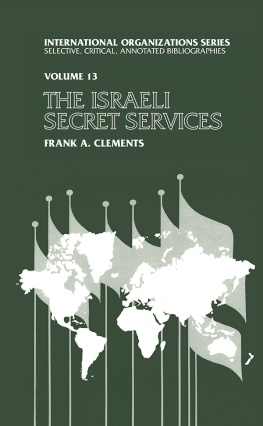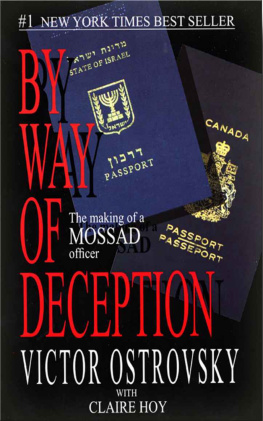INTERNATIONAL ORGANIZATIONS SERIES
General Editors:
Robert G. Neville (Executive Editor)
John J. Horton
Robert A. MyersJohn Paxton
Ian WallaceHans H. Wellisch
John J. Horton is Deputy Librarian of the University of Bradford and currently Chairman of its Academic Board of Studies in Social Sciences. He has maintained a longstanding interest in the discipline of area studies and its associated bibliographical problems, with special reference to European Studies. In particular he has published in the field of Icelandic and of Yugoslav studies, including the two relevant volumes in the World Bibliographical Series.
________________
Robert A. Myers is Associate Professor of Anthropology in the Division of Social Sciences and Director of Study Abroad Programs at Alfred University, Alfred, New York. He has studied post-colonial island nations of the Caribbean and has spent two years in Nigeria on a Fulbright Lectureship. His interests include international public health, historical anthropology and developing societies. In addition to Amerindians of the Lesser Antilles: a bibliography (1981), A Resource Guide to Dominica, 1493-1986 (1987) and numerous articles, he has compiled the World Bibliographical Series volumes on Dominica (1987), Nigeria (1989) and Ghana (1991).
________________
John Paxton was the editor of The Statesmans Year-Book from 1969 to 1990. His published works include The Developing Common Market, The Dictionary of the European Communities (which was commended by the McColvin Medal Committee of the British Library Association), The Penguin Dictionary of Abbreviations, The Penguin Dictionary of Proper Names (with G. Paton), Companion to Russian History, Companion to the French Revolution, and The Statesmans Year-Book Gazetteer. He was also chief consultant editor of the New Illustrated Everymans Encyclopaedia.
________________
Ian Wallace is Professor of German at the University of Bath. A graduate of Oxford in French and German, he also studied in Tbingen, Heidelberg and Lausanne before taking teaching posts at universities in the USA, Scotland and England. He specializes in contemporary German affairs, especially literature and culture, on which he has published numerous articles and books. In 1979 he founded the journal GDR Monitor, which he continues to edit under its new title German Monitor.
________________
Hans H. Wellisch is Professor emeritus at the College of Library and Information Services, University of Maryland. He was President of the American Society of Indexers and was a member of the International Federation for Documentation. He is the author of numerous articles and several books on indexing and abstracting, and has published The Conversion of Scripts and Indexing and Abstracting: an International Bibliography, and Indexing from A to Z. He also contributes frequently to Journal of the American Society for Information Science, The Indexer and other professional journals.
First Published 2017 by Ashgate Publisher
Published 2016 by Routledge
2 Park Square, Milton Park, Abingdon, Oxon OX14 4RN
711 Third Avenue, New York, NY 10017, USA
Routledge is an imprint of the Taylor & Francis Group, an informa business
All rights reserved. No part of this book may be reprinted or reproduced or utilised in any form or by any electronic, mechanical, or other means, now known or hereafter invented, including photocopying and recording, or in any information storage or retrieval system, without permission in writing from the publishers.
Notice:
Product or corporate names may be trademarks or registered trademarks, and are used only for identification and explanation without intent to infringe.
Library of Congress Catalog Number: 96-17331
Library of Congress Cataloging-in-Publication Data
Clements, Frank, 1942-
Israeli Secret Services / Frank A. Clements.
p. cm.(International organizations series: v. 13)
Includes bibliographical references and index.
ISBN 1-56000-228-X (alk. paper)
1. Israel. Mosad le-modi in ve-tafkidim meyuhadimBibliography. 2. Intelligence serviceIsraelBibliography. 3. Secret service IsraelBibliography. I. Title. II. Series: International organizations series (New Brunswick, N. J.): v. 13.
Z6724.I7C54 1996
[JQ 1830.A56I6]
016.327125694dc20 96-17331
96-17331
ISBN 13: 978-1-4128-0814-9 (pbk)
ISBN 13: 978-1-56000-228-4 (hbk)
The Institute for Intelligence and Special Services, or the Mossad as it is better known, has long had the confidence of the Israeli population, a privilege not shared by other intelligence services in the Western world. This is largely explained by the creation of the State of Israel in 1948, an event which was followed by a period of isolation, military threats on all of its borders, and guerrilla attacks within its borders. The support enjoyed by the Mossad, however, was demonstrated in utter secrecy as, until the 1970s, the existence of the organization was not acknowledged within Israel.
In order to understand the present-day situation and the development and effectiveness of the Mossad, it is necessary to go back to the period before the creation of the State of Israel, for this branch of Israeli intelligence has its roots in the pre-Second World War situation in Palestine and Europe.
The Jewish struggle against the British administration and the Arabs during the period of the Mandate gave rise to a number of underground organizations both within Palestine and also among the Jewish communities, especially in Europe. As the Jews were a minority population in a strongly contested state, the Jewish Agency for Palestines priority was the encouragement of Jewish emigration. This was contrary to the terms of the Mandate and the policy of the British authorities.
Illegal immigration from Europe was encouraged but on a relatively small scale until the real impact of the policies of the Third Reich began to be felt in the late 1930s. Germanys policy towards its Jewish population began to cause alarm amongst sections of the population and also gave rise to anti-Semitic feeling in other countries in Europe, especially in Eastern Europe and France. Consequently the Jewish underground discovered that it had a large-scale operation on its hands, both in terms of numbers and also on account of the logistical problems of dealing with regimes that were becoming more hostile and less likely to acquiesce in the process. It was from this ferment that the Mossad Aliyah Beth developed, in order to provide the clandestine network of agents and the infrastructure necessary to secure emigration from Europe to Palestine. It gradually built up a network of Jewish agents and sympathizers throughout Europe and was funded by the Jewish Agency for Palestine and the wider Jewish community. Countries such as Yugoslavia were used as staging posts, with ships being chartered to land immigrants on the Palestine coast, usually at night, at which time another network took over to evade the British authorities. Operations were carried out against a backcloth of strictly controlled legal immigration and a British policy of deportation of illegal immigrants, designed to satisfy the terms of the Mandate and also to suppress opposition from the majority Arab population.
The appearance of concentration camps in Germany accelerated the emigration from Europe as it became a question of survival for the Jewish population. Accordingly, the operations of the Jewish underground became more sophisticated, organized and dangerous. The costs of the operation also increased as the price of documents, bribes and shipping rose in line with the risk factor.












